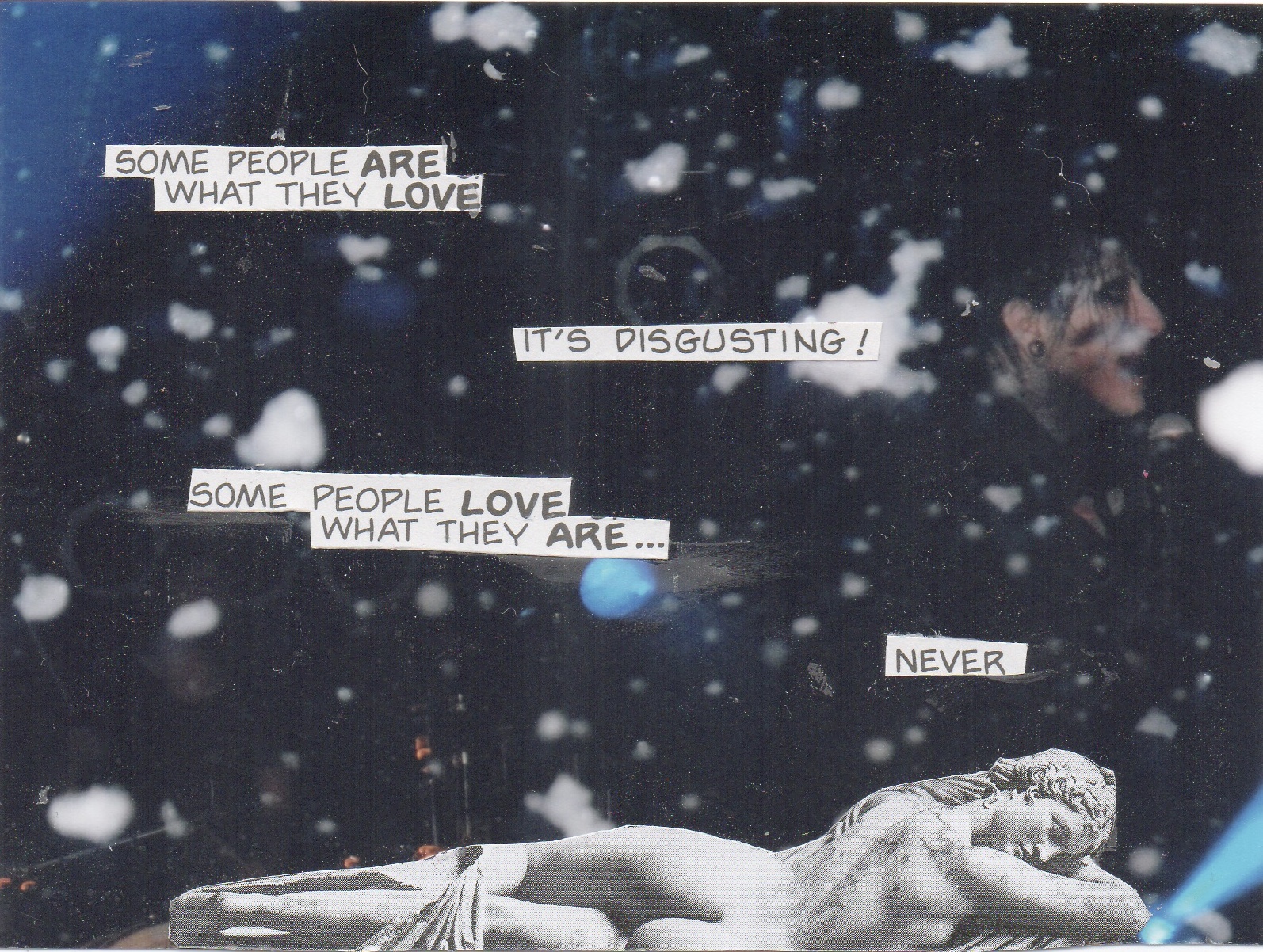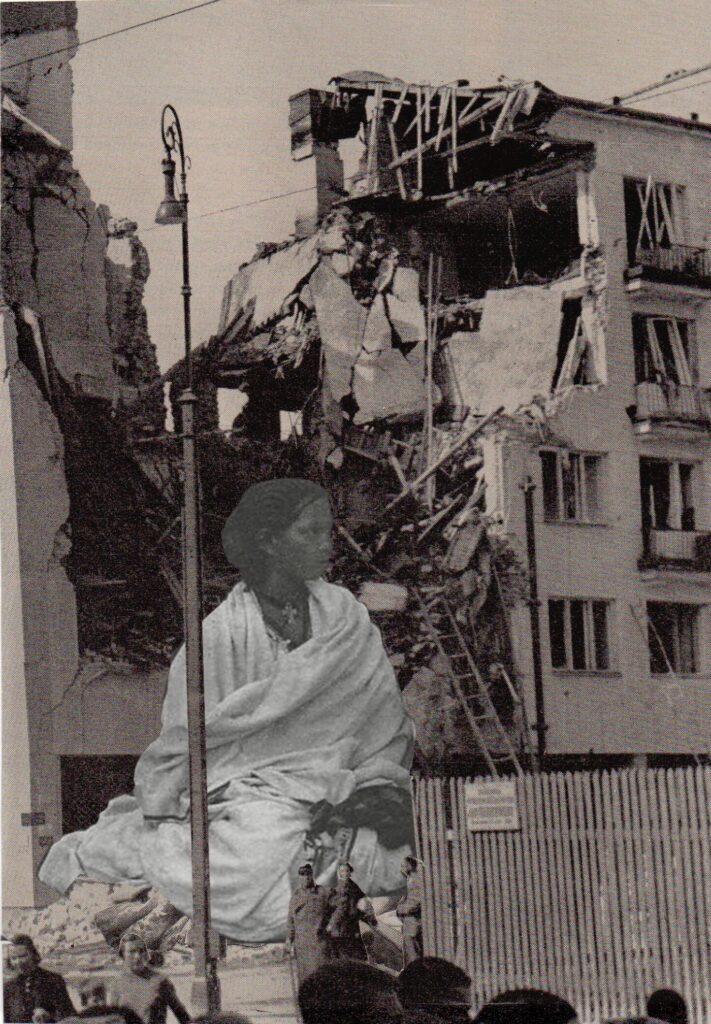The most important love we have will always be for ourselves and our lives. It is only from this lodestar, our own definition and practice of love, that we can turn love back out into the world and towards our people.

May 1, 2023
This piece is part of the Love Letters notebook, which features art by Ali El-Chaer.
“I have returned to an earlier difficulty I’ve had with poetry as diagnosis, namely that diagnosis is not enough. When crisis is so acute, it seems useless to point out the crisis. It made me wish I had more poems that offered some movement beyond diagnosis, some vision from ‘yes, but’ to ‘yes, but . . . and . . . ’”
—Solmaz Sharif
Sharif goes on to say that the duty of the writer is to remind us that we will die, and that we aren’t dead yet. My friends and I talk a lot about how it feels to be alive—many of us are learning to live after long periods of surviving, of grieving, of being outside of the world. I urge you to read the flash notebook Swati Khurana edited for The Margins, “Remains,” which speaks so thoughtfully to the difficulty of living purely in the present when we love. In their editor’s note, they write, “I have often wondered if when we begin to love, we begin to mourn immediately.” I recently came across an interview with Myung Mi Kim, where she expressed her frustration with what we make being re-enacted or replicated by empire. When we elect to survive here, it is difficult and contradictory—we are asked to survive within the very power structures we are plotting to upend. I myself wonder if how we look for and talk to one another in that contradiction is the way we move from surviving to living. I express the considerations of so many others to begin this note because it is together that we must do this work. If—and I do believe this—the only thing that is really ours are our perceptions and convictions, then the work we do is in the ordinary act of being in the world. That space where we love ourselves and the people we have chosen to love is where we can begin to live, critique, create, protect, and mobilize.
In this folio are twelve stories that capture several different perspectives, angles, and actions on loving in the world, as well as an artist interview with the one and only Ali El-Chaer. Over the year that I’ve been conceptualizing and working on this, I’ve been most excited by the ways love has wound its way into even the making of this folio. I’ve talked with writers over coffee, call or email; had fascinating discussions with Ali on their spectacular art (many of their pieces include each of their own analyses of the stories, their own concepts, nearly their own worlds); and thought through how my own definitions and experiences of love coincide and reshape themselves with what is displayed. When I write my own poems, I imagine myself playing host in a room—sometimes that room is a grief circle, a party, a friend debrief, an off-Broadway play. When the work is shared, I leave the room. “Love Letters” feels like a gathering, an assembly. As an editor, a reader, and a writer, I imagined how a discussion between each of these stories and their writers would go. This note maps that reimagination.
Our first story, Sanna Wani’s “Summer Storm / Winter Storm,” invites us in. There is writing that offers us departure, escape, and there is writing that opens you. Wani’s story introduces us to a world made simpler and more beautiful because the narrator is in love. “Sometimes I confuse love with silence,” Wani writes, “Stillness.” When I read this story, I think about how being in love can make more room inside of yourself to just be; the world feels closer simply because there is more of your spirit occupying it. The quiet Wani brings to the page is not one created by dismissal or even absence—it’s presence, attention.
Rather than thinking about each of the stories in this folio as purely love stories, I ask you to consider how they use love to negotiate more difficult considerations about living in the world. In Saba Keramati’s “You Just Told Your Mother You Don’t Want Children,” the narrator confronts her mother’s generational expectation that she be a mother herself. When the story ends with the narrator saying “I got this,” we leave with an understanding that the narrator carries for herself, her needs, and her mother. This is how love helps the narrator make sense of this heavy conversation between the two; she loves from the place where love for herself and her mother meet. I’m reminded of “Maly Maly Maly,” a story in Anthony Veasna So’s Afterparties, in which a character says, “I will keep this: standing here in the Videodrome, watching my cousin grow into the same mother across all her reincarnated selves, as I wonder about my own kteuy-ness, how it fits into the equation before me, and doesn’t.” I was most drawn to So’s work for how it branched further into the themes encircling Asian diasporic literature—the grief of being un-homed, re-homed, motherhood, family, community, among others. I am so uninterested in the criticisms of mango poetry or literature as trivial, overdone, and constraining; the deep concern and embrace of these feelings that make our realities, the further complication of them, are what brings us the presence—as in Wani’s work—we need to be in the world.
When Abigail Mengesha and I convened about her folio piece, “I Thought Love Was a Country,” we talked for a long time over coffee about avoidance as a form of self-intimacy and self-protection. This poem speaks for itself, but the beauty of it is in the speaker’s willingness to just be as they are, and acknowledge the self for all that it is, has done, will do, and be brave enough to move from. Here, forgiveness and compassion for the self become a form of tenderness and direction forward. The grief that visits Mengesha’s poem also pervades Jihyun Yun’s “(Mis)translation.” There is a dark comedy in lines of Yun’s piece—“Then he slaps the top of the sample casket like a car salesman. You can fit so many fathers in this baby, I hear in my head.” Translation, in this story, is a vulnerable act of love towards the father, an act of the living, and a protective veil between the narrator and the world. “Outside, the day is beautiful,” Yun writes. But in mourning, she is not yet a part of it. Still, the translation of her father’s funeral in real time is an opening, a window, into the world while remaining with the one of them who has passed.
In “[the zuihitsu remembers the shape of your forgetting],” Lydia Abedeen’s story—and I use the words story and poem loosely throughout this folio and note— she writes an ode to her almost-daughter. Over email with me, Abedeen introduced herself as primarily a grief writer writing on, among other things, her time in a religious cult, motherhood, and miscarriage. “You must know how your myth will end,” Abedeen writes in her piece. “You must be willing.” Like in Mengesha’s piece, to love is to deal with the difficult task of holding a life, of writing, and finally, of making sense of its end. The final line, “you let them bury,” rings—there is a tenderness to letting go here, that you must let the bodies bury for them to be laid to rest. It is here, in the measured re-telling of this grief, that her almost-daughter’s life is honored.
What is a folio exploring the nitty-gritty of love without a story about an eternal situationship? Our midpoint stories, Nina Dewi’s “Possession” and Murzban F. Shroff’s “A Beautiful Relationship” and “The Price of Freedom” offer us external rather than intrinsic conceptions of love. In Dewi’s story, we are greeted with a love that may already be familiar to us—romantic, singular, obsessive, delightful. Of course, this is a love story between a ghost and her living occupant. “Notice me,” Dewi writes. “Notice me.” Less an ask than a demand, the narrator sets her invisible eyes on a harmless white man whose baby picture looks like “a hardboiled egg, flesh pale and glossy.” (Maybe there were two ghosts in the house.) I’m most drawn in by how unapologetically attentive, endearing, and petulant the narrator is in her quest for this man. The narrator’s self-awareness brings about a kind of reaching desire that’s actually less about him than it is about her. And so we root for her.
We meet Juhi and Ava in Shroff’s two stories, two characters who are restrained by the social and cultural expectations of marriage. “After all, family was everything,” Shroff writes, “and love was all about sacrifice.” Both Juhi and Ava leave loveless marriages out of love for themselves and experience the consequences of it. By defining love for themselves against its social demands, they are confronted with a cognitive dissonance of sorts—Ava is “repulsed to find that she missed the warmth of her husband’s arms” after being excluded from her uncle’s wedding as a divorcee. Still, these frictions between what is felt and what is expected bring these characters closer, ultimately, to their lives. The losses—of income and social space—are exchanged for “true love” (Juhi) and “newfound freedom, waking up late, working out at the gym, meeting friends” (Ava). Shroff’s stories confront the sobering complications of “love” as a mechanism of power, a demand for the wives in these marriages.
Over Google Meet, Eliot Li and I went back to his first draft of his story “Yellowstone.” He talked about how he kept revising out of the complexity of intergenerational trauma and the reluctance at the end. When he had shared a first draft of the story in a writing workshop, people had told him to tone down the trauma and bring in some kind of explicit sadness at the end so that the narrator made sense. (You can guess who was in the room.) “Sense” is an interesting formula because most of the diasporic felt experience is not something that should make broad sense—it is selectively felt, accessed, and understood. That’s protective; to be comprehended is to be claimed. In Li’s “Yellowstone,” the difficulty of the end is in the narrator’s guilty relief. While he loves Mei-Lien, the weight of her grandmother’s memory on the both of them threads through the story as a haunting. By the end, we arrive at an emotional reckoning without explanation; namely, that love is not always enough.
Shreya Fadia’s “Give and Take” and George Abraham’s “After,word” introduce us to their characters / speakers via two distinct styles of writing—speaking from the peripheries (showing) and speaking from the throat (telling). Gay yearning—no queer love story is complete without it. The quiet drama of Fadia’s story is as much about what is left unsaid as what is spoken. So much of its allure is in the story itself—its tensions and section drop-offs. “The blue is the blue of meadow skies; it honeys Georgia’s skin,” Fadia writes. “Anjali stops herself from reaching out to touch the cashmere.” The mismatched tension between Georgia and Anjali fleshes out their characters—Fadia, like Shroff, considers the power imbalance between them and their entanglement.
George Abraham’s “After,word” is a true manifesto, but the “telling” of Abraham’s motivations, reflections, and convictions is nuanced by the questions they leave in the wake of these convictions. I have been a fan of Abraham’s work for a long time, and it was a pleasure to be with their work again in the context of this folio; “After,word” also reads as a love letter to their first collection, Birthright. (Their poem-mapping in the back of the book, a reverse table of contents, directly informed how I mapped this editor’s note.) “I confess,” Abraham writes, “I wrote Birthright for people like him, if only for a single moment. If you’re reading me, I want you to feel small, dare I say, compact.” And so, here, we find my deepest belief about loving—it is fierce. Fiercely critical, fiercely protective, and fiercely aware of the self, those whom the self loves, and the world around that space. Love—and for that matter, kindness—is a reckoning. Recall stories of mothers heaving cars off of their children in the event of an accident, the way we excise and defend against those who harm our beloveds, ourselves. Kindness, not niceness, is what calls for clear and practiced action in the direction of love—it moves with the understanding that the place we and our beloveds care for one another must be viciously defended.
Finally, we end on one of my all-time favorite loves—friend love. The sweet, homey, fill-your-heart-with-honey kind in Nathan Xie’s “The Effect of Time on Collective Consciousness,” and the devastating, all-consuming, vaguely homoerotic kind in Qianze Zhang’s “Jeannie.” Both are valid. Xie’s piece lets us in on a Zoom call between childhood friends. These are the friends you know who know you like they raised you (some did). There’s a lot unspoken in this story too, but Xie brings us closer to the characters than Fadia does as they exercise their familiarity with one another to fill in gaps. “We noticed Brian untense his jaw,” Xie writes. “What Pandora didn’t know and nobody would tell her: in Kevin’s sophomore year of college, he overdosed and went to the ER.” The characters look after one another throughout the call, even to their—perhaps final—parting. I’m reminded of one of my best friends telling me in the first few months of our friendship—I’m always going to seek to understand you, to see you, and hold you in full regard. What a gift friendship love is, in all its forms. Yet, when we read “Jeannie,” I consider the full ramifications of that sentence. Zhang’s story is a tour de force in obsessive female friendship—the “loving” perversions of jealousy and insecurity, owing and ownership rear their heads in this story in, for me, realistic and satisfying ways. I consider, too, the conversations I had with Zhang about the resentment between the characters in her first draft; Zhang’s revisions exercised more compassion for the narrator, receding from the harmful fixation she had on Jeannie. Zhang’s examination asks us to consider the way resentment manifests from a place of powerlessness, how love can be misaligned by power. The perceived devotion of the narrator to Jeannie is what pulls this piece to its chilling end.
The most important love we have will always be for ourselves and our lives. It is only from this lodestar, our own definition and practice of love, that we can turn love back out into the world and towards our people. I have experienced—and cultivated—transformational, life-affirming love in the relationships of my life (mentors, friends, lovers), and it’s why I believe in its existence. In my heart is a list of every leap someone who loves me has made towards me; every time they have, in seeing a light, pointed me back towards it; every language that has participated in our shared and collective understanding of the world; every kind word.
When Abby and I go with each other to chest X-rays and gyno appointments. When Ilene and I call from halfway across the world and she brings me back to earth with a laugh where we stop speaking for a long time. When Dalia asks me how my heart is. When Janet calls it desahogarse after we spend time together. When Tariq and I go to our favorite diner for five hours. When my baby cousin asks me when I’m coming home. When Devi and I make food together, trying to give each other the better version of the dishes we make. When my first love confessed that he was supposed to leave the city when we met and stayed for me; we wrote love letters when we let each other go and I thought to myself how lucky it was to have someone to share them with, not just write to. When Gabby and I catch our heels on each other’s bar stools. When Sarah says it’s okay and I know it is just because she said so. When Ghinwa writes me a four-page handwritten guide with doodles for my weeklong catsitting gig. When Wilson is absentminded but texts me back immediately. When I take myself on four-hour walks in lockdown. When I make myself a playlist to remember how I felt at this specific time and listen to it never again. When I don’t write things down because I’ll remember it. When I make little jewelry, sunglasses, and note stations on top of my dresser to remind myself the day is possible. When I remind myself the day is possible. When I tell my therapist the day is possible. When I learn that, actually, the day is more than possible, it is here and I am carrying all of these other loves into it. When. Thank you for reading. I hope you enjoy.



